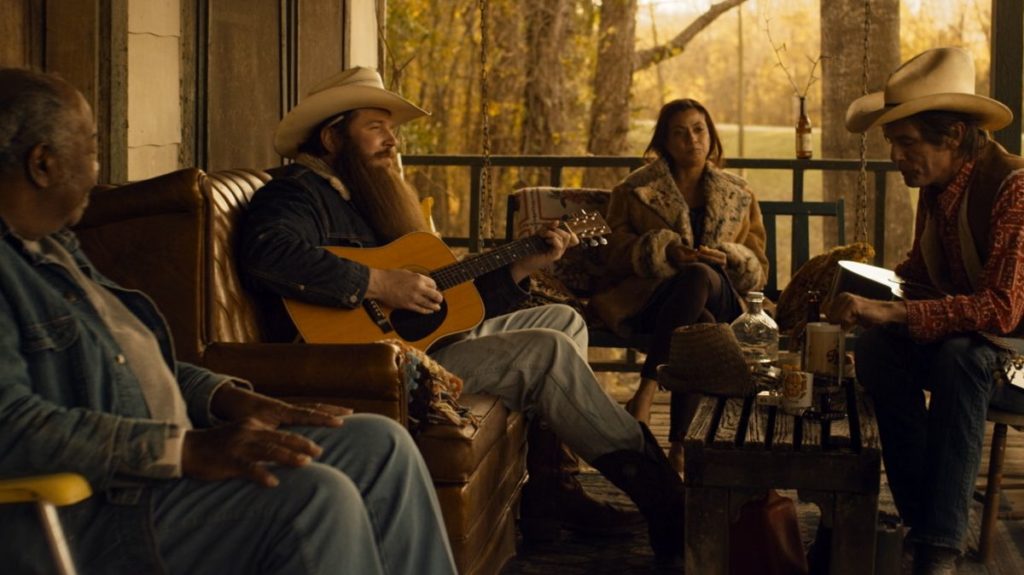Blaze Foley, born Michael David Fuller (Ben Dickey), is a man with veins of self-destruction in his soul and strips of duct tape on his suit jackets — the irony, of course, is too perfect. He hitches a guitar to the end of his gut and finger picks tunes of heartache and yearning. In country music, these two themes run rampant, so they define the narrative of “Blaze,” Ethan Hawke’s remarkable meditation on the life of the country music legend.
It’s through Hawke’s sympathetic eye that the audience sees Blaze’s, and the film’s, cataclysmic spiral into heartbreak and misery, both of which are nudged along by Blaze’s uncontrolled alcoholism and crippling self-sabotage.
Though “Blaze” is a dramatization of the ’70s musician Blaze Foley’s life, Hawke doesn’t adhere to typical biopic conventions. The narrative is unconventional and hazy, but at its center, Hawke charts the weeks leading up to Blaze’s death. Woven into the central narrative in which Blaze records a live album at a dingy bar, is a radio interview with fellow singer-songwriter Townes Van Zandt (Charlie Sexton) and “Zee” (Josh Hamilton), a friend of Townes and Blaze. The purpose of the interview is to mourn Blaze’s recent death. In woeful tones, Townes and Zee explain how Blaze was shot defending his friend whose son came to collect his father’s welfare money at the beginning of each month, ending what could have been a long and successful career.
Townes and Zee present the equally celebratory and sorrowful legacy of Blaze’s life. Townes reveled in the same nights blurred by liquor and cocaine that defined the end of Blaze’s life, and his respect for Blaze, Hawke insinuates, comes not only from his music but also for his attraction to the same unhealthy lifestyle. Zee, also present at these drunken gatherings, saw Blaze’s addiction for what it was, though it’s only after Blaze’s death does Zee come to terms with his own negligence.
It’s through these two lenses that Hawke asks us to judge his main character and the men with which he surrounds himself. It’s also a gorgeous transition into Blaze’s relationship with Sybil Rosen (Alia Shawkat), a budding actress whom Blaze meets as he does construction work in the space she rehearses. The key to “Blaze,” and to this romance, is in the acting of Dickey, whose baritone vocals stop just short of the real Foley’s cavernous grumble. Dickey’s performance earned him the Special Jury Award for Achievement in Acting at Sundance Film Festival — and rightfully so. Dickey mimics the real Foley’s twirling country accent identically, which is coupled with his lion-like beard and twinkling, misty eyes. The genuinity of the actor meshes seamlessly with the reality of the man.
The kinky-haired and strong-willed Sybil is the calm equivalent to Blaze’s calamitous disposition, and her unwavering support for Blaze is made plain through Shawkat’s dedicated and vibrant performance. Their love is explored through the idyll in which they live — a treehouse on the outskirts of Texan society — where they savor in the languor of their paradise and sing together on different octaves of Blaze’s songs. It’s intensely blissful. That’s why it can’t last.
So, under the pretense of expanding Blaze’s career, Sybil suggests the two move to Austin, Texas. She gets a job at a diner while he travels to different cities and plays at an endless number of dingy bars. He doesn’t charm many with his tendency to interject in his own shows, often pausing midway through a song to tell a story or give his thoughts to his audience, but his deep voice is enchanting — enough so that he woes and flirts with a number of women on his travels. So quickly is every moment between Sybil and Blaze rendered insignificant. Hawke doesn’t go subtle on the melancholy imagery, and the effect is fiercely harrowing. To watch their relationship crumble as swiftly as it does kills every moment the two shared in the treehouse before. “Do you think we’re born knowing how to love? Why do we forget?” Sybil asks Blaze one night as they lay in bed together. “Plain old livin’, I’d imagine,” he replies. The lines are painful to revisit after seeing the second half of the film.
Blaze chases women from dismal bar after dismal bar, yet he still writes to Sybil. It’s an obvious attempt to sustain something already in decline. “Every song I hear about a man and a woman, I think about us and cry,” he says in one letter. At the same time, Hawke shows a scene of Blaze in the back of a car with another woman and Sybil smoking with an anonymous man. This imagery chips away even more at the couple’s previously solid foundation, even though it’s understood neither knows the extent of each other’s affairs. The audience members take the brunt of emotional force instead. They feel the unwarranted strings pulling Sybil and Blaze apart. But they also find themselves enchanted by Hawke’s focus on the nuances of dejection. These specific emotions are the basis of Blaze’s music, and they’re lovely to admire in his songs and on screen.
But perhaps the most admirable element of “Blaze” is the endless stretch of enrapturing dialogue, provided by Hawke and the real-life Sybil, whose memoir is the basis for the film. The unexpected poetic side to a stoic man is the wheel upon which this movie turns. And the anecdotes and sometimes poorly timed jokes aren’t quite as funny as the film goes on. By the end, all the audience has left to cope with is the bitter, gnawing sense that with the demise of Blaze’s eloquence is the decline of his character. While the couple’s Texas treehouse was a romantic incubator for Blaze and his music, the real world holds too many unavoidable implications — something their relationship, and Blaze’s happiness, cannot withstand.




















